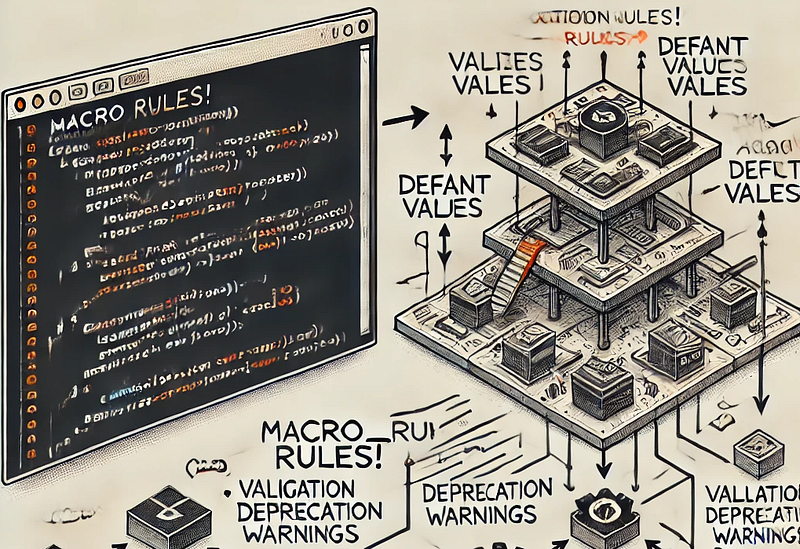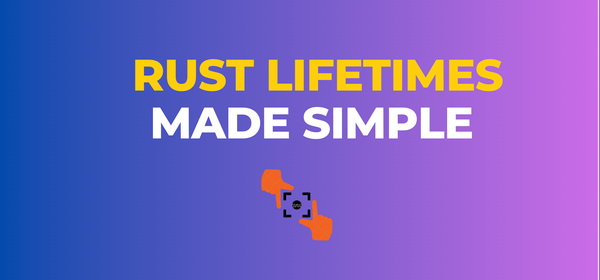Creating flexible, complex, and reusable structures in Rust with macros
Macros in Rust are a convenient and powerful way to write code that writes other code, enabling you to create highly reusable and flexible…

Macros in Rust are a convenient and powerful way to write code that writes other code, enabling you to create highly reusable and flexible components. One of the advanced uses of macros is to define complex configuration structures, which we will explore in this article.
Let’s dive right in! 🦀
Understanding macro_rules!
The macro_rules! macro system in Rust allows you to define patterns and specify how they should be expanded into Rust code. This is particularly useful for boilerplate code, ensuring consistency and reducing the chance of errors. Macros can take parameters, match specific patterns, and generate code based on these patterns.
Simplified Example: Defining Configuration Structures
Let’s start with a simplified example to demonstrate how macro_rules! can be used to define configuration structures. Our goal is to create a macro that generates a struct with default values, a module containing functions to return these defaults, and an implementation of the Default trait.
Step-by-Step Implementation
- Defining the Macro
First, we define the macro, specifying the pattern it should match. Each configuration field will have a name, type, and default value.
macro_rules! define_config {
($(
$(#[doc = $doc:literal])?
($name:ident: $ty:ty = $default:expr),
)*) => {
// Struct definition
pub struct Config {
$(
$(#[doc = $doc])?
pub $name: $ty,
)*
}
// Default values module
mod defaults {
use super::*;
$(
pub fn $name() -> $ty { $default }
)*
}
// Implement Default trait
impl Default for Config {
fn default() -> Self {
Self {
$(
$name: defaults::$name(),
)*
}
}
}
};
}2. Using the Macro
We use the macro to define a Config struct with several fields.
define_config! {
/// The number of threads to use.
(num_threads: usize = 4),
/// The timeout duration in seconds.
(timeout_seconds: u64 = 30),
/// The path to the configuration file.
(config_path: String = String::from("/etc/app/config.toml")),
}3. Generated Code
The macro invocation will expand to:
pub struct Config {
pub num_threads: usize,
pub timeout_seconds: u64,
pub config_path: String,
}
mod defaults {
use super::*;
pub fn num_threads() -> usize { 4 }
pub fn timeout_seconds() -> u64 { 30 }
pub fn config_path() -> String { String::from("/etc/app/config.toml") }
}
impl Default for Config {
fn default() -> Self {
Self {
num_threads: defaults::num_threads(),
timeout_seconds: defaults::timeout_seconds(),
config_path: defaults::config_path(),
}
}
}Key Elements
- Struct Definition
The struct Config is defined with public fields. Each field can have an optional documentation comment, which is included using $(#[doc = $doc])?.
2. Default Values Module
A module named defaults is generated. This module contains functions that return the default values for each field. These functions are used in the Default implementation.
3. Default Trait Implementation
The Default trait is implemented for the Config struct. This implementation uses the functions from the defaults module to initialize each field with its default value.
Benefits of Using Macros for Configuration Structures
- Code Reusability: Macros allow you to define repetitive patterns once and reuse them throughout your codebase.
- Consistency: Ensures that similar structures follow the same pattern, reducing the chance of inconsistencies.
- Maintenance: Updating the structure or adding new fields is straightforward, as changes are made in a single place (the macro definition).
Extending the Example
To further illustrate the power and flexibility of macros in Rust, let’s extend our example to include more advanced features such as deprecated fields and custom validation logic.
Adding Deprecation and Validation
We will enhance our macro to support deprecated fields and custom validation functions. This will allow users to define fields that should be validated according to specific rules and emit warnings if deprecated fields are used.
Enhanced Macro Definition:
macro_rules! define_config {
($(
$(#[doc = $doc:literal])?
$(#[deprecated($dep:literal, $new_field:ident)])?
$(#[validate = $validate:expr])?
($name:ident: $ty:ty = $default:expr),
)*) => {
// Struct definition
pub struct Config {
$(
$(#[doc = $doc])?
pub $name: $ty,
)*
}
// Default values module
mod defaults {
use super::*;
$(
pub fn $name() -> $ty { $default }
)*
}
// Implement Default trait
impl Default for Config {
fn default() -> Self {
Self {
$(
$name: defaults::$name(),
)*
}
}
}
// Validation implementation
impl Config {
pub fn validate(&self) -> Result<(), String> {
let mut errors = vec![];
$(
if let Some(validation_fn) = $validate {
if let Err(e) = validation_fn(&self.$name) {
errors.push(format!("Field `{}`: {}", stringify!($name), e));
}
}
)*
if errors.is_empty() {
Ok(())
} else {
Err(errors.join("\n"))
}
}
pub fn check_deprecated(&self) {
$(
if let Some(deprecated_msg) = $dep {
println!("Warning: Field `{}` is deprecated. {}", stringify!($name), deprecated_msg);
println!("Use `{}` instead.", stringify!($new_field));
}
)*
}
}
};
}Using the Enhanced Macro:
define_config! {
/// The number of threads to use.
(num_threads: usize = 4),
/// The timeout duration in seconds.
(timeout_seconds: u64 = 30),
/// The path to the configuration file.
(config_path: String = String::from("/etc/app/config.toml")),
/// A deprecated configuration field.
#[deprecated("Use `new_field` instead", new_field)]
(old_field: String = String::from("deprecated")),
/// A new configuration field.
(new_field: String = String::from("new value")),
/// A field with custom validation.
#[validate = |value: &usize| if *value > 100 { Err("must be 100 or less") } else { Ok(()) }]
(max_connections: usize = 50),
}Generated Code:
fn main() {
let config = Config::default();
// Check for deprecated fields
config.check_deprecated();
// Validate configuration
match config.validate() {
Ok(_) => println!("Configuration is valid."),
Err(e) => println!("Configuration errors:\n{}", e),
}
}Key Elements Explained
- Deprecation Handling:
The macro supports a deprecated attribute, which takes a message and a new field name. When check_deprecated is called, it prints warnings for deprecated fields and suggests the new field to use.
2. Custom Validation:
Each field can have a custom validation function specified using the validate attribute. The validate method on the Config struct runs all validation functions and collects errors.
3. User-Friendly Methods:
The generated struct includes methods for checking deprecated fields and validating the configuration, making it easy for users to ensure their configuration is correct and up-to-date.
Benefits of the Enhanced Macro
- Backward Compatibility: Deprecation warnings help users transition to new fields without breaking existing configurations.
- Custom Validation: Ensures that configuration values meet specific criteria, enhancing robustness.
- User Convenience: Automatically generated methods simplify the validation and transition process for users.
Final Thoughts
Experimenting with macros can open up new possibilities in your Rust projects. Start with simple macros, understand their pattern matching and expansion, and gradually build more complex and functional macros.
🚀 Explore More by Luis Soares
📚 Learning Hub: Expand your knowledge in various tech domains, including Rust, Software Development, Cloud Computing, Cyber Security, Blockchain, and Linux, through my extensive resource collection:
- Hands-On Tutorials with GitHub Repos: Gain practical skills across different technologies with step-by-step tutorials, complemented by dedicated GitHub repositories. Access Tutorials
- In-Depth Guides & Articles: Deep dive into core concepts of Rust, Software Development, Cloud Computing, and more, with detailed guides and articles filled with practical examples. Read More
- E-Books Collection: Enhance your understanding of various tech fields with a series of e-Books, including titles like “Mastering Rust Ownership” and “Application Security Guide” Download eBook
- Project Showcases: Discover a range of fully functional projects across different domains, such as an API Gateway, Blockchain Network, Cyber Security Tools, Cloud Services, and more. View Projects
- LinkedIn Newsletter: Stay ahead in the fast-evolving tech landscape with regular updates and insights on Rust, Software Development, and emerging technologies by subscribing to my newsletter on LinkedIn. Subscribe Here
🔗 Connect with Me:
- Medium: Read my articles on Medium and give claps if you find them helpful. It motivates me to keep writing and sharing Rust content. Follow on Medium
- LinkedIn: Join my professional network for more insightful discussions and updates. Connect on LinkedIn
- Twitter: Follow me on Twitter for quick updates and thoughts on Rust programming. Follow on Twitter
Wanna talk? Leave a comment or drop me a message!
All the best,
Luis Soares
luis.soares@linux.com
Lead Software Engineer | Blockchain & ZKP Protocol Engineer | 🦀 Rust | Web3 | Solidity | Golang | Cryptography | Author



